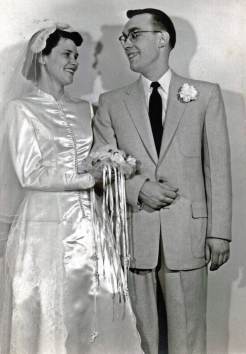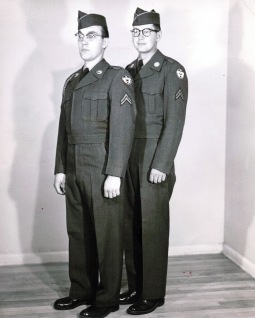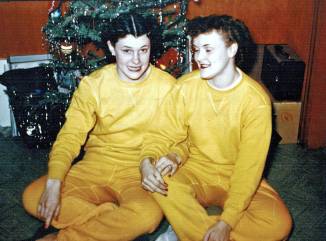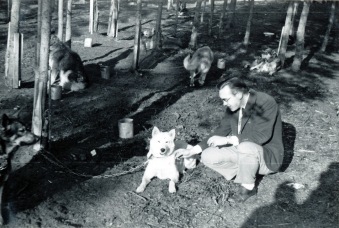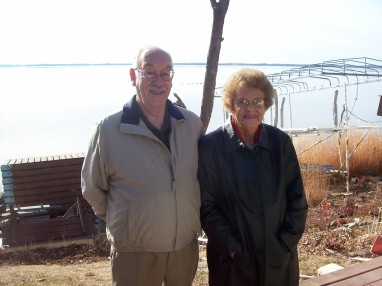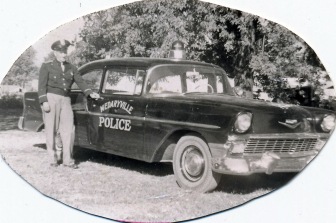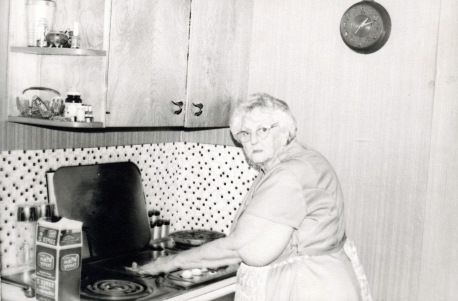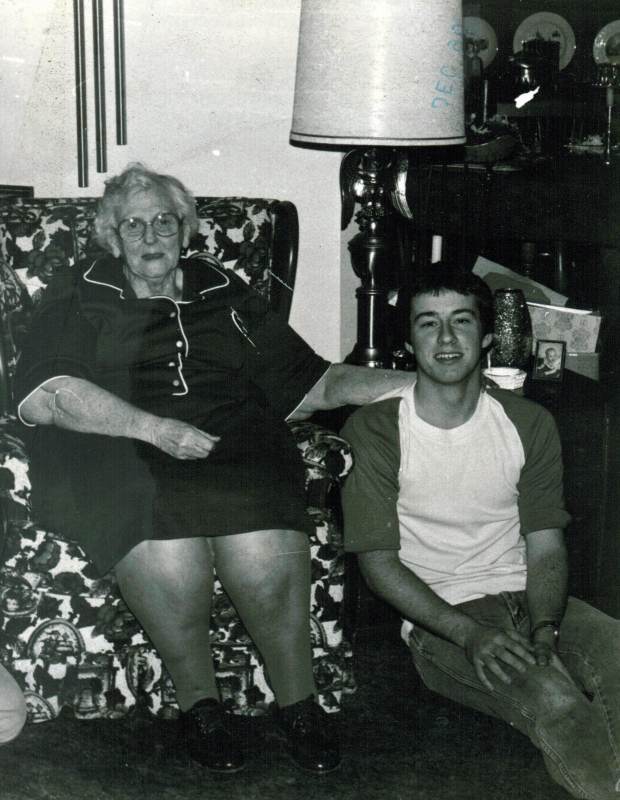
As for most of us, getting old was one of Grandma’s archenemies. She accepted its inevitability, but that didn’t mean she cared for it one bit. In her letters, she took every opportunity to express her disgust with everything that came with advanced age. She also had little sympathy for everyone growing old right along with her – their getting old was their problem, not hers. And in her final year, she took Dylan Thomas‘ advice and showed no intention of going “gentle into that good night.”
After Grandpa died in 1974, Grandma and their youngest child Ellie, who had Down syndrome, continued to live in their home in Medaryville, Indiana. After Aunt Ellie died in 1977, Grandma would come to Iowa and stay part of most years with us. With Grandma around, my mom often complained about having another ornery kid in the house – although this “kid” was a sharp-tongued, practical-joking senior citizen who saw the opportunity for dirty play in every card game, even if it meant cheating her grandkids. We caught her most times … she was a determined but poor card cheat.
Grandma described living with us in a letter to my Aunt Mae:
“This family is the goingest family I ever saw. Carol works in the mornings, plays bridge Thursday afternoons, gets the boys to ballgames, runs to the store, gets meals ready, tonight there’s a party here for Howard’s customers, supper out another night for his employees, Monday afternoon is her PEO Christmas party here and what else is coming up, I don’t know. The world just buzzes around me, and I do as I please.”
During Grandma’s last stay with us, her heart landed her in the hospital twice. Her first “spell” happened on a Christmastime evening. It started with Mom asking me to help her in Grandma’s room. Grandma was a plus-sized woman and, as she got older, she occasionally needed some help getting out of her chair. Sometimes it took two of us pulling on both sides with Grandma huffin’ and puffin’ and cussin’ the whole way up. But when I got to her room this time, Grandma was in her chair with her head slumped to her chest, unconscious and panting for air. My mom, a registered nurse, was kneeling next to her with her stethoscope to Grandma’s chest. She calmly told me to call 911. A great thing about living in a small rural town: A paramedic heard the call on her scanner, grabbed her medic bag, ran down the street and was at our front door almost before I’d hung up with the 911 operator. It took the ambulance another 60 seconds to arrive. Slow pokes.
The next evening, while my brother and I were visiting Grandma in the hospital, she mentioned how annoyed she was with the monitor beeping out her every heartbeat. She had an idea: “Let’s see if I can get that infernal racket to stop.” She took a big gulp of air and held her breath. At first, we thought she’d just hold her breath for a few seconds and let it out … joke over. But she continued, and the beeps from the heart monitor were indeed slowing! Only after we yelled at her to knock it off did she finally take another breath and start cackling. Besides practical jokes, gallows humor was another of her specialties.
A second heart episode followed three months later. Grandma was in her room knitting while my parents and some friends were playing cards in the kitchen (yeah, we play a lot of cards). Suddenly, a loud “THUD!” came from the direction of Grandma’s room. Everyone rushed back to find her on the floor, flat on her back and seemingly unconscious. Someone said, “Call 911!” My dad knelt next to her, and noticed she wasn’t breathing and her complexion changing quickly to a very dark shade of purple.
“Forget the ambulance,” he said. “I’m afraid we need to call the funeral home this time.”
No sooner had he said this than Grandma gasped loudly, opened her eyes and, like that, she was back among the living. After another short stay in the hospital, she was back at our home, knittin’ afghans and mittens, and cheatin’ death and card players.
Early that summer, Grandma had recovered enough to make the return trip to Indiana. She died a few months later. The news of her death was something I was prepared to hear. After her heart episodes with us, it seemed just a matter of time before she’d have an unrecoverable event. Still, when Mom told me she’d died, the first thought that crossed my suddenly numbed mind was, “Are you sure?”
Here are a few of her written opinions and observations about getting old, death and proper denture care:
“Those old farts from the center took two buses and went to the state fair Sunday. They were in wheelchairs and using canes. I could just see someone pushing me around in a wheelchair. They’d say, ‘Mary, give it up!’ Old age is worse than a disease that’s incurable.”
______________________________________
“The strawberry patch is loaded, but I can’t pick them. I tried hoeing around the tomatoes, and now I’m pooped. I also tried pulling some weeds, and I see I can’t do that either. I guess I’d just as well give up and sit the rest of my life out. But I’m like an old bull … I keep trying.”
______________________________________
“I must of caught Lynn’s cold, and I’ve really had a siege of it. Can’t get my breath and at times I cough so hard, I began writing my obit. Now today, I have an appointment to have my head put back in place.”
______________________________________
“Everyone’s going to Indy this weekend and seems like they think I could go too, but taking two Lasix a day and with the pot in the basement there, I’d never make it and I don’t think my heart would take it either. So if anyone wants to see me, they know where I live.”
______________________________________
“Well, I must stop now. I have to find a couple flashlights and help your dad in the garden. He was bent over pulling weeds and his teeth must a fell out of his shirt pocket without his noticing. Now it’s dark out and he can’t find them. The old fool needs to keep them in his mouth where they belong!”
Besides not wearing his dentures, Grandpa also had a hearing aid that spent more time out of his ear than in it. I assume the low audio quality, discomfort and bulkiness of hearing aids from that era affected how often Grandpa used his. I also suspect that not using it was a convenient way to amplify his selective listening with Grandma.
By picking out the few words he thought he heard, he could fake his way through many conversations with well-timed nods of the head and grunts of understanding. That approach also left him open to some spectacular misunderstandings: One summer day when my cousin Rhonda was at their house, Grandma asked her to tell Grandpa that an alert on TV just said a funnel cloud was heading in their direction. Grandpa was outside admiring the garden, so Rhonda went out on the front steps and yelled, “Grandpa! There’s a tornado coming here!” Grandpa looked up at her and yelled back, “Oh, I think the tomatoes are doing great this year!”
